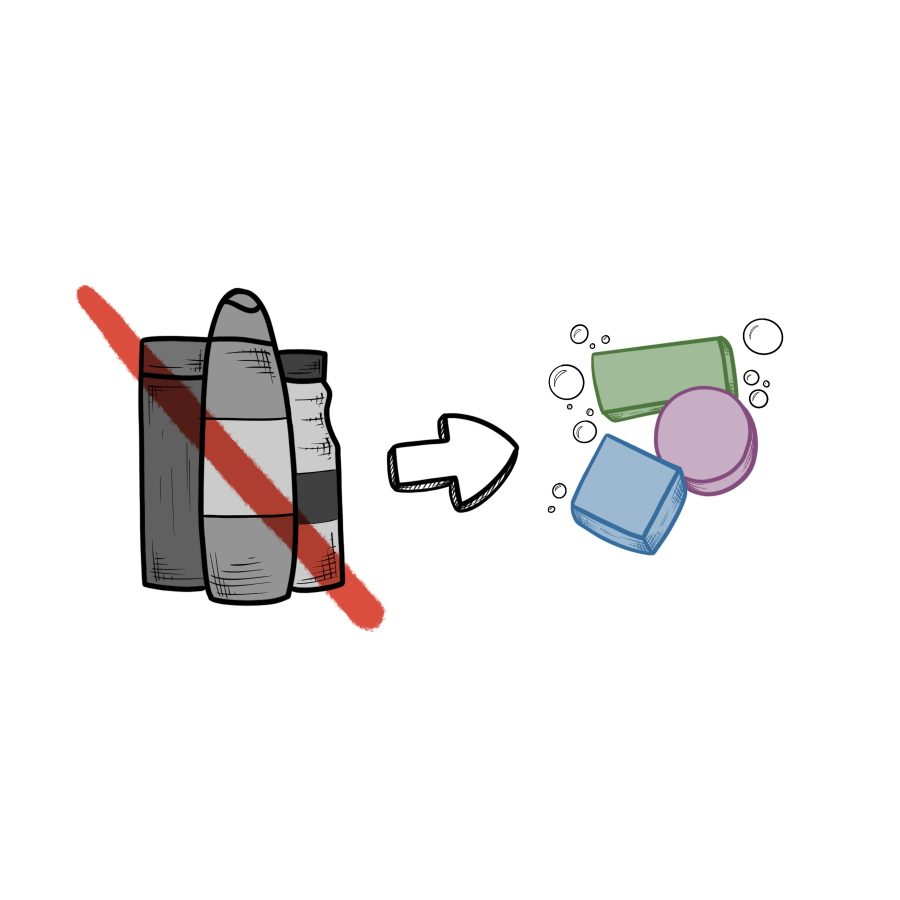Plastic products are the past
Easy, affordable and sustainable swaps that can prevent plastic consumption
Single-use plastics dominate our daily lives, and they’re getting harder to ignore. Around 380 million metric tons of plastic are produced annually, and though that doesn’t all fall under single-use plastic, it’s still an unbelievable number. Sustainable living has some flexibility, but its core focus lies in the minimization of personal waste, an aspiration that is attainable on a variety of levels.
Since starting college, I’ve switched to a variety of more sustainable products for a couple of different reasons; the environmental benefits are certainly a plus, but the convenience that sustainable alternatives offer for students, in particular, is astounding.
Reusable water bottles are an absolute staple as a college student, especially with the refill stations present in pretty much every building across our campus. Americans purchase roughly 50 billion single-use water bottles a year, or about 13 bottles a month for every person in the U.S. Using reusable water bottles helps save up to 156 plastic bottles annually, so bring your Brita or Hydro Flask or whatever water bottle you have for emotional support and use it! Starbucks and Einstein’s both offer reusable bottles or cups to further minimize the use of plastic cups on campus, and a cute reusable cup is a wonderful investment of end-of-semester bonus bucks.
Grocery bags and Ziplocs are other forms of plastic that you probably see or use daily, but guess what: there are alternatives for them too. Reusable tote bags or mesh produce bags are great for grocery runs, and some stores like Target and Trader Joe’s offer discounts or other incentives for bringing them with you. When it comes to snack baggies like Ziplocs, I like to use sealable silicone bags that I can easily wash and use again. The set I have includes bags of three different sizes, and they’ve been immensely helpful in keeping food fresh for long periods of time.
Soap bars are another sustainable swap and are a really easy, low-budget way to minimize plastic waste. You’ve seen regular bars of body soap, yes, but shampoo and conditioner bars are also a thing, and I love them. In a shared bathroom situation, they save so much space, aren’t as strenuous on shower shelves/racks and often last me whole semesters, all while being more eco-friendly than their plastic-packaged alternatives. I highly, highly recommend looking into hair care bars because there is such a wider variety than you would first expect, and they’re becoming much more mainstream. Pricing can vary a bit depending on the brand you buy from, but overall they aren’t very expensive and are quite durable.
Continuing with toiletries, bamboo toothbrushes are another easy swap to make to cut down on plastic use, especially since toothbrushes have a suggested product lifespan of three to four months before they need to be replaced. The function of course stays the same as regular toothbrushes, but the bamboo handles prevent accumulation of plastic waste. Tangentially, toothpaste tablets are also on the rise as a way to counteract the plastic tubing typically found with oral hygiene products. Though I don’t use them, I will say I admire the equal portion design that allows for consistent amounts of product to be used.
As a college student, I know budgets can be pretty tight sometimes, but the appeal of these sustainable swaps is their longevity compared to other products that aren’t designed to be used repeatedly. Many of these swaps, among others, are investments of a sort, meaning that they might be a bit pricier upfront, but will pay themselves off with use over the course of their product lifespan. Even with that said, sustainable swaps aren’t efficient for everyone, and that’s fine — so long as we stay aware of our own levels of consumption and try to minimize them in other ways. There are a lot of ways to be sustainable, and you can find what works best for you.
Outside of Earth Week, it’s vital to always practice being environmentally conscious. While carbon emissions stemming from industrial-scale practices are the prime driver of climate change, individual action can still make an impact on the level of consumption we each participate in. Utilizing sustainable alternatives not only makes a difference, but can help persuade others to change their practices as well. Given how ingrained the use of plastic has become in our society, this change is crucial — but it can start with you.

My name is Ava Peinhardt (she/her), and I'm the Opinions Editor for the Trinitonian. I'm a senior from Plano, TX majoring in Environmental Studies with...





